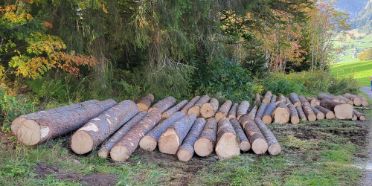Valorising forests’ adaptation to climate change
This project investigates how forest adaptation measures can be valued and proposes recommendations for pathways towards the valorisation of forests' adaptation to climate change in the Swiss context.
Steckbrief
- Beteiligte Departemente Hochschule für Agrar-, Forst- und Lebensmittelwissenschaften
- Institut(e) Multifunktionale Waldwirtschaft
- Forschungseinheit(en) Waldpolitik und internationales Waldmanagement
- Förderorganisation Schweizerische Eidgenossenschaft (Bundesverwaltung)
- Laufzeit (geplant) 01.08.2025 - 30.06.2027
- Projektleitung Prof. Dr. Jerylee Wilkes-Allemann
-
Projektmitarbeitende
Prof. Dr. Jerylee Wilkes-Allemann
Dr. Mélanie Feurer
Dr. Jean-Laurent Pfund
Johanna Trummer -
Partner
Bundesamt für Umwelt BAFU
European Forest Institute - Schlüsselwörter Forest, Climate change, Instruments, Valorisation
Ausgangslage
Since 1992 (adoption of UNFCCC), several initiatives aimed to mitigate climate change. Nevertheless, global temperatures continue to rise, accompanied by more frequent and severe extreme weather events. The Paris Agreement seeks to limit warming to well below 2°C and pursue 1.5°C, further establishing a global goal on adaptation to enhance resilience and reduce vulnerability. Other initiatives include the EU Green Deal, targeting climate neutrality by 2050, and Switzerland’s Climate and Innovation Law. Achieving the goals of these initiatives requires coordinated mitigation and strong adaptation measures. Forests are central to these efforts but also highly vulnerable to climate impacts. Strengthening their adaptive capacity is in this context critical. Without proactive strategies, forests risk species loss, reduced carbon storage, and degraded services. Adaptive management, including close-to-nature silviculture, long-term risk-based planning, and promotion of structural and genetic diversity, is essential for resilience. Yet implementation requires substantial resources. In Switzerland, although federal support for forest adaptation has been approved, austerity measures threaten its continuity. This underscores the need for innovative approaches to assign economic value to adaptation, enabling large-scale implementation and stakeholder engagement. To date, no projects have systematically investigated this potential. Our project addresses this gap.
Vorgehen
The project is structured into three work packages. WP1 (Assessing Valorisation Measures) involves conducting a desk-based review to analyse scientific and grey literature, with the aim of identifying existing measures, approaches and examples of the economic valorisation of forest adaptation at national and international levels. Additionally, around eight semi-structured interviews with experts from the fields of research, practice and administration will validate and complement these findings. The outcome will be a consolidated overview of current valorisation practices. WP2 (Developing and Validating Approaches) builds on the results of WP1, developing a comprehensive analysis of potential approaches with a focus on the Swiss context. This will be refined through a co-creation workshop organised with our project partner, the European Forest Institute (EFI), involving around ten European experts. The results of the workshop will be analysed qualitatively to produce a draft analysis, which will be further validated in WP3. The final work package will synthesise the results from WPs 1 and 2 and develop pathways towards the economic valorisation of forest adaptation. These pathways will be validated through three expert interviews in Switzerland. The final output will be a report containing the key findings and recommendations, which will be discussed with FOEN and refined based on EFI's feedback.

